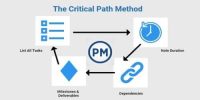Economic feasibility is concerns with whether expected cost savings, increased revenue, increased profits, reductions in required investment and others types of benefit with exceeds the cost of developing and operating a proposed system. It determines whether the required software is capable of generating financial gains for an organization. For example, if a project cannot, cover its development cost, it would not be approved, unless mandated by government regulations or other considerations.
In addition, it is necessary to consider the benefits that can be achieved by developing the software. It involves the cost incurred on the software development team, estimated cost of hardware and software, cost of performing the feasibility study, and so on. The software is said to be economically feasible if it focuses on the issues listed below.
- A cost incurred on software development to produce long-term gains for an organization
- Cost required to conduct full software investigation (such as requirements elicitation and requirements analysis)
- Cost of hardware, software, development team, and training.
Economic feasibility elements include, but are not limited to:
- Increased and/or Decreased agency revenue,
- Increased and/or Decreased agency costs,
- Increased and/or Decreased revenue to other agencies and/or the general public,
- Increased and/or Decreased costs to other agencies and/or the general public.
They also provide independent project assessment and enhance project credibility.















